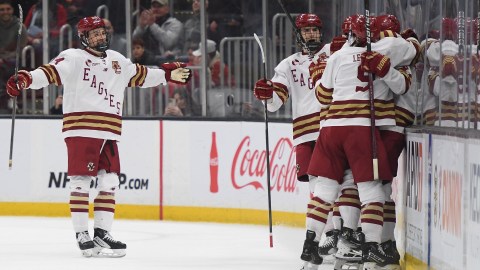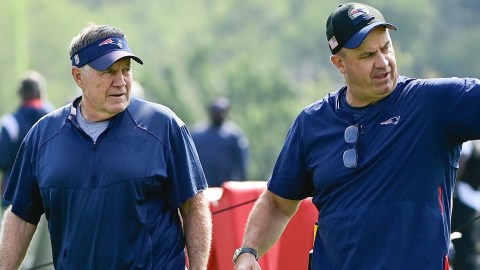Boston College will face Miami (Ohio) on April 8 in a Frozen Four semifinal tilt at Detroit’s Ford Field.
The two teams have some history, and Boston College is no stranger to pressure.
The Eagles will be appearing in their ninth Frozen Four in the last 13 years. They’ve won two national championships in the past decade, most recently in 2008.
Here are 10 reasons why they can win it all again.
Discipline
The Eagles average just 12.6 penalty minutes per game, the 16th-fewest in the nation and the fewest of the four teams left standing. By contrast, Miami (Ohio), BC’s next opponent, averages 19.6, the second-most in the country. Although BC’s penalty kill ranks a respectable 18th on the season, it gave up four goals on 12 chances this weekend, so staying out of the sin bin will be crucial in Detroit.
The top defensive pairing
Freshman Brian Dumoulin and senior Carl Sneep comprise arguably the best defensive pairing in the country. Dumoulin, who should be named to the national all-rookie team, is second in the country with a plus-33 rating. Opponents simply have no easy path to the net when he’s on the ice. Sneep, meanwhile, is one of the game’s top offensive defensemen. He ranks sixth nationally among blue liners with 11 goals this season.
John Muse
The junior goaltender hasn’t been fantastic lately — he’s given up 14 goals in his last three games — but he has a lot of big-game experience, which is always important at this time of the season. Two years ago, as a freshman, Muse backstopped the Eagles to their national title run. He was particularly impressive in the Frozen Four, as he saved 49 of the 51 shots he faced in those two games. A repeat performance, or something close to it, would make BC tough to beat
Versatility
As the Eagles have proven these past two weekends, they can win both defensive struggles and offensive shootouts. They beat Vermont and Alaska, two teams that like to slow things down, 3-0 and 3-1, respectively. They beat Maine and Yale, two teams that like to run and gun, 7-6 and 9-7. That ability to play both types of games will be critical again in the Frozen Four. Miami likes the slower pace, but Wisconsin and RIT both like to go up and down.
Speed
The biggest reason BC is able to play both varieties of games successfully is its speed. Against teams that trap, the Eagles are fast enough to get the puck through the neutral zone quickly and then win footraces to the corner. Against aggressive teams, they’re fast enough to take advantage of turnovers and turn them into odd-man rushes before the opposition’s backcheck can catch up. It might not happen in the Frozen Four because of the high skill level, but BC has literally skated circles around some of its opponents this season.
Experience
Seven Eagles were on the national championship squad from two years ago, and the four seniors reached the title game as freshmen, too. They know what it’s like to play on this stage, and they’ll share their experiences with the underclassmen. As for those underclassmen, don’t expect them to be awestruck. They’ve already played in front of big crowds at Fenway Park, the Beanpot, the Hockey East semis and final, and the regionals.
The captains
You’d be hard-pressed to find a better group of captains in college hockey than seniors Matt Price, Matt Lombardi and Ben Smith. Smith won Hockey East’s Len Ceglarski Sportsmanship Award this season, but it could’ve gone to any member of this trio. They emanate class both on and off the ice, and their poised, two-way play sets the tone for the entire team.
Jerry York
Where do the players get all that class? From their coach, of course. York’s calm demeanor keeps everyone at ease regardless of the size of the stage or the score of the game. He follows the old cliche about never getting too high or too low, and that keeps everyone focused on the task at hand. And with the most wins of any active coach and three national championships under his belt, why shouldn’t York be at ease in the Frozen Four?
The top line
York created a monster when he put Joe Whitney, Brian Gibbons and Cam Atkinson on the same line on a Tuesday night in mid-January. In their 22 games together, they’ve averaged 1.64 goals per game. Atkinson has been particularly beastly. He’s recorded three hat tricks in his last 10 games and is now tied for second in the country with 27 goals on the season. In the regional final against Yale, the trio combined for six goals, four assists and a plus-14 rating.
Offensive depth
The only thing scarier than their great top line is the three very good lines that follow it. The next best grouping features two 30-point scorers in Smith and Jimmy Hayes and another 20-point scorer in Chris Kreider. Each member of that line has at least 12 goals. After that is the trio of Paul Carey, Pat Mullane and Steven Whitney, all of whom have reached the 20-point plateau as well. Then there’s the checking line of Price, Lombardi and Barry Almeida, which is used to shut down the opposition’s top threesome. But even that line can score — it has six goals in its last three games.



